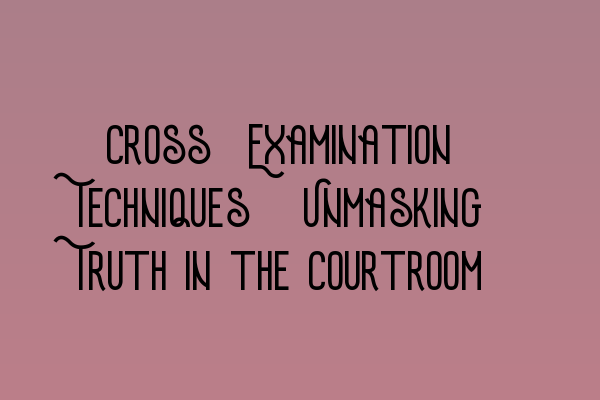Cross-Examination Techniques: Unmasking Truth in the Courtroom
Welcome to the SQE Criminal Law & Practice Law UK blog! In today’s post, we will delve into the fascinating world of cross-examination techniques and how they can help unmask the truth in the courtroom. Cross-examination is a crucial aspect of the legal process, allowing lawyers to challenge witnesses and test their credibility. It is an art that requires skill, preparation, and a deep understanding of the case at hand.
The Importance of Cross-Examination
Effective cross-examination is essential for uncovering inconsistencies, exposing biases, and challenging the reliability of witness testimony. It offers an opportunity for lawyers to present their case, question the opposing party’s evidence, and shape the narrative in their client’s favor. By utilizing strategic techniques, lawyers can unravel the truth and influence the outcome of a case.
Cross-Examination Techniques
1. Leading Questions: Leading questions are a valuable tool during cross-examination. By phrasing questions in a way that suggests the desired answer, lawyers can guide witnesses towards revealing information that supports their case. However, be cautious not to ask leading questions that will be objected to by opposing counsel.
2. Impeachment: Impeachment involves challenging the credibility of a witness by presenting evidence that contradicts their testimony. This can be achieved by introducing prior inconsistent statements, demonstrating bias or motive, or highlighting errors and inconsistencies in their testimony. Impeachment can greatly undermine the credibility of a witness and diminish the impact of their testimony.
3. Controlling the Witness: Controlling the witness is crucial for effective cross-examination. Lawyers must master the art of maintaining control while appearing respectful and professional. Techniques such as pacing, pausing, and mirroring can be used to influence the witness’s responses and create a favorable impression for the judge and jury.
Preparation is Key
The success of cross-examination relies heavily on thorough preparation. It is essential to familiarize yourself with the case, review relevant documents, and anticipate potential responses from witnesses. Preparation allows lawyers to craft compelling questions, identify weaknesses in the opposing party’s case, and maintain control during cross-examination. The SQE 1 Practice Exam Questions and SQE 1 Practice Mocks FLK1 FLK2 articles provide valuable resources for honing your skills and simulating real-life scenarios.
Sign up for SQE Preparation Courses
At SQE Criminal Law & Practice Law UK, we offer comprehensive SQE 1 and SQE 2 preparation courses that cover all key topics, including cross-examination techniques. Our expert tutors provide practical advice, guidance, and resources to help you succeed in your legal career. Whether you are a seasoned lawyer or a law student, our SQE 1 Preparation Courses and SQE 2 Preparation Courses are tailored to meet your requirements.
To ensure you stay up to date with the latest legal developments and SQE exam dates, be sure to check the SRA SQE Exam Dates article regularly.
Cross-examination is a powerful tool in the hands of a skilled lawyer. By employing the right techniques, lawyers can uncover the truth and shape the outcome of a case. Effective cross-examination requires careful preparation, a deep understanding of the case, and the ability to adapt and think on your feet. As you continue to refine your skills, remember to stay professional, ethical, and always seek justice.
